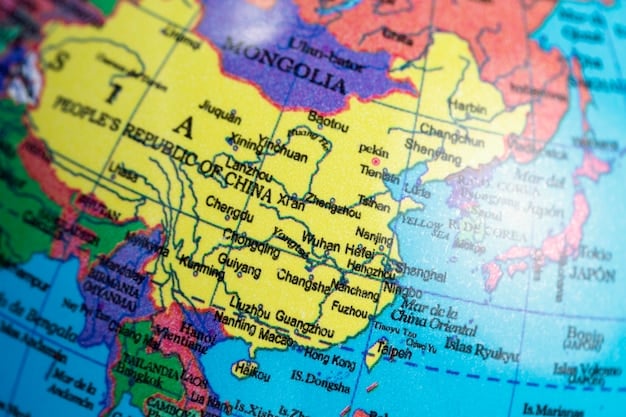US Climate Policy: Impact on Diplomatic Ties with Key Allies

The US’s fluctuating stance on international climate agreements significantly impacts its diplomatic relations with key allies, leading to strains in cooperation and trust depending on the level of commitment to global climate goals.
The United States’ approach to international climate agreements has become a complex and often contentious aspect of its foreign policy. How Does the US’s Current Stance on International Climate Agreements Affect Diplomatic Relations with Key Allies? The answer involves understanding the interplay between environmental commitments and the broader geopolitical landscape.
Understanding the US Climate Policy Landscape
The United States has historically played a pivotal, albeit sometimes inconsistent, role in international climate negotiations. Its policies and commitments have varied significantly across different administrations, reflecting shifting priorities and political ideologies.
Key US Climate Policy Milestones
Over the years, the US has participated in and, at times, spearheaded various climate initiatives. These include landmark agreements that have shaped the global response to climate change.
- The Kyoto Protocol: Initially signed by the US, it was later rejected, setting a precedent for its wavering commitment to global climate action.
- The Copenhagen Accord: The US played a significant role in shaping this accord, which aimed to set emission reduction targets.
- The Paris Agreement: The US initially joined this landmark agreement, committing to reduce its emissions by 26-28% below 2005 levels by 2025, but later withdrew.
These milestones illustrate a pattern of engagement followed by disengagement, which has had profound effects on how other nations perceive and interact with the US on climate issues.
Domestic Climate Policies and their Impact
US domestic policies, such as the Clean Power Plan and investments in renewable energy, also reflect its approach to climate change. These policies not only affect domestic emissions but also signal the nation’s intentions to the international community.

In conclusion, the US climate policy landscape is characterized by fluctuations and shifts in commitment, greatly impacting its diplomatic relations with key allies.
The Paris Agreement and Transatlantic Relations
The Paris Agreement serves as a focal point for understanding the dynamics between the US and its European allies. The agreement, which aims to limit global warming to well below 2 degrees Celsius, has been a cornerstone of international climate cooperation.
US Withdrawal and European Disappointment
When the US announced its withdrawal from the Paris Agreement, it was met with widespread disappointment and condemnation from European leaders. This decision was seen as a rejection of multilateralism and a disregard for the urgency of climate action.
European nations, which had been strong advocates for the Paris Agreement, viewed the US withdrawal as a setback. It strained diplomatic relations and raised questions about the reliability of the US as a partner on global issues.
Areas of Continued Cooperation
Despite the disagreements over the Paris Agreement, the US and European nations still find common ground in certain areas of climate cooperation. Research and development in renewable energy technologies, for example, continue to be collaborative endeavors.
- Clean Energy Technologies: Collaborative projects in solar, wind, and energy storage technologies.
- Climate Research: Joint research initiatives to understand climate patterns and impacts.
- Climate Finance: Discussions on mobilizing financial resources to support climate action in developing countries.
While these areas of cooperation exist, the fundamental divergence on the Paris Agreement remains a significant challenge in transatlantic relations.
In conclusion, the US stance on the Paris Agreement has significantly strained transatlantic relations, despite continued cooperation in certain areas.
The US and Asian Allies: Climate Diplomacy Challenges
The US approach to climate agreements also affects its relationships with key Asian allies, including countries like Japan, South Korea, and Australia. These nations, while having their own unique climate policies, generally seek a stable and predictable partnership with the US.
Differing Priorities and Expectations
Asian allies often have different priorities and expectations concerning climate diplomacy compared to the US. For instance, some countries may prioritize economic development over aggressive emission reduction targets.
These differing priorities can lead to tensions when the US pushes for stricter climate policies that may conflict with the economic interests of its Asian allies.
The Role of China
China’s growing influence in the Asia-Pacific region also complicates the US climate diplomacy efforts. As the world’s largest emitter, China’s actions significantly impact the global climate. The US and its Asian allies must navigate their relationships with China while addressing climate change.

These challenges underscore the complexity of climate diplomacy in the Asia-Pacific region and the need for a nuanced approach that considers the diverse interests and priorities of all stakeholders.
In conclusion, navigating climate diplomacy with Asian allies requires understanding their unique priorities and the influence of China.
Economic Implications of US Climate Stance
The US stance on international climate agreements has significant economic implications, both domestically and for its relationships with allies. These implications range from trade and investment to technology transfer and competitiveness.
Impact on Trade Relations
When the US adopts policies that diverge from international climate norms, it can affect trade relations with countries that are committed to aggressive climate action. Carbon tariffs and other trade measures may be imposed on US goods and services.
- Carbon Tariffs: Potential taxes on goods imported from countries with lax climate policies.
- Trade Agreements: Climate provisions in trade agreements may be affected by US withdrawal from international commitments.
- Investment Flows: Diverting investments towards countries with stronger climate commitments.
These economic consequences can strain diplomatic relations and undermine the overall economic partnership between the US and its allies.
Opportunities in Green Technology
Conversely, a strong US commitment to climate action can create new economic opportunities, particularly in the development and deployment of green technologies. Collaboration with allies in this area can foster innovation and create jobs.
In conclusion, the US climate stance has wide-ranging economic implications that significantly influence its diplomatic relations.
The Role of Public Opinion and Domestic Politics
Public opinion and domestic politics play a crucial role in shaping the US stance on international climate agreements. Shifting public attitudes and the political polarization of climate change can greatly influence policy decisions.
Changing Public Perceptions
Public perceptions of climate change have evolved significantly over the years. Increased awareness of the impacts of climate change, driven by scientific reports and media coverage, has influenced public support for climate action.
However, these changes in public perception do not always translate into consistent political action, as other factors, such as economic concerns and party affiliation, come into play.
Political Polarization and Policy Shifts
Climate change has become increasingly polarized in US politics, with stark differences in attitudes and policies between Democrats and Republicans. This polarization can lead to abrupt policy shifts when there are changes in administration.
In conclusion, public opinion and domestic politics exert a strong influence on the US approach to international climate agreements.
Future Scenarios and Potential Pathways
Looking ahead, several scenarios and potential pathways exist for the US and its allies to navigate the challenges of climate diplomacy. These pathways involve different levels of US engagement and cooperation.
Rejoining International Agreements
One potential scenario is for the US to rejoin international agreements such as the Paris Agreement. This would signal a renewed commitment to global climate action and could help rebuild trust with allies.
In conclusion, the future of US climate diplomacy depends on its willingness to engage and cooperate in international climate efforts.
| Key Point | Brief Description |
|---|---|
| 🌍 US Policy Shifts | Fluctuations in US climate commitments strain diplomatic relations. |
| 🤝 Transatlantic Ties | Paris Agreement withdrawal caused disappointment among European allies. |
| 🌏 Asian Diplomacy | Differing priorities and China’s influence complicate US climate efforts. |
| 💰 Economic Impact | US climate stance affects trade, investment, and green technology collaboration. |
Frequently Asked Questions
▼
The Paris Agreement is an international accord adopted in 2015. It aims to limit global warming to well below 2 degrees Celsius above pre-industrial levels and to pursue efforts to limit the temperature increase to 1.5 degrees Celsius.
▼
The US withdrawal from the Paris Agreement strained relations with key allies, particularly in Europe. It undermined trust and raised questions about the US commitment to multilateral cooperation on climate issues.
▼
Carbon tariffs are taxes imposed on goods imported from countries with lax climate policies. They are designed to level the playing field and encourage countries to adopt more stringent climate measures.
▼
China’s climate policy significantly impacts US diplomacy in Asia. The US and its allies must balance their relationships with China while addressing climate change, given China’s status as the world’s largest emitter.
▼
Public opinion plays a crucial role in shaping US climate policy. Increased awareness of climate change impacts public support for climate action, though political polarization can lead to inconsistent policy decisions.
Conclusion
In conclusion, the relationship between the US stance on international climate agreements and its diplomatic relations with key allies is multifaceted. Shifting policies, economic implications, and domestic politics all play significant roles in shaping these dynamics. Navigating these complexities requires a nuanced approach that recognizes the diverse interests and priorities of all stakeholders, emphasizing the need for consistent engagement and cooperation to address the global challenge of climate change effectively.





